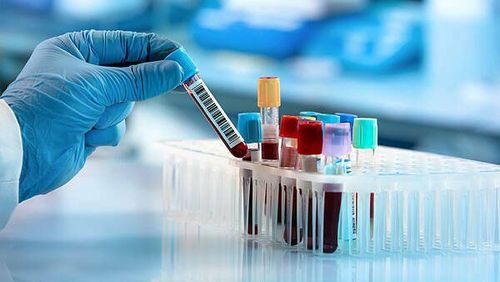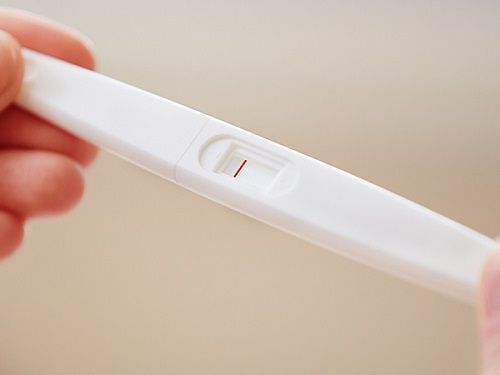This is an automatically translated article.
An ectopic pregnancy is a pregnancy that does not implant in the uterus as it should. If the ectopic pregnancy is detected late, the mother will face many serious complications. Early recognition of the typical signs of an ectopic pregnancy will help pregnant women have timely examination and treatment.
1. What are the 3 typical signs of an ectopic pregnancy?
Symptoms of an ectopic pregnancy usually begin to appear between the 4th and 12th weeks of pregnancy. Some women don't have any symptoms at first. They may not find out they have an ectopic pregnancy until an early ultrasound shows a problem or they experience more severe symptoms later.
3 typical signs are:
Typical clinical signs suggestive of an ectopic pregnancy are amenorrhea, abdominal pain and abnormal vaginal bleeding. A woman of reproductive age admitted to the hospital with the above symptoms should be a warning to the clinician. Doctors will often prefer to order laboratory tests and ultrasound to rule out the diagnosis of ectopic pregnancy before thinking about other conditions.
A missed period is a sign of pregnancy. Some people who are suspected of being pregnant have a positive pregnancy test before going to a medical facility.
Vaginal bleeding is considered a symptom when it tends to be slightly different from the usual menstrual cycle. Vaginal blood in an ectopic pregnancy may be dark brown in color. Some women mistake this bleeding for their period and don't realize they're pregnant. Irregular vaginal bleeding during pregnancy is relatively common and isn't necessarily a sign of a serious problem, but you should see your doctor if you're experiencing it.
You may have abdominal pain, usually on one side of the lower abdomen. Pain may develop suddenly or gradually and may be persistent and disappear quickly. Abdominal pain can have many causes, including those coming from the digestive system. Therefore, abdominal pain that occurs alone does not necessarily mean that you have an ectopic pregnancy. But you should get medical advice if you have abdominal pain and think you might be pregnant.
Shoulder pain is an unusual pain in the shoulder, which is connected to the arm. It's not known exactly why it happens, but shoulder pain can be a sign of an ectopic pregnancy that can cause bleeding inside the abdomen, so you should see your doctor right away if you're experiencing any of these symptoms. this state.
In addition to the above signs, during an ectopic pregnancy, you may have pain when urinating or have diarrhea. Some changes in bladder characteristics and normal bowel movements also occur as physiological changes during pregnancy, or these symptoms may be due to urinary tract infections and enteritis. But you're better off seeing your doctor if you experience these symptoms and think you might be pregnant.

Dấu hiệu lâm sàng gợi ý mang thai ngoài tử cung là mất kinh
2. Symptoms of threatened ectopic pregnancy
In some cases, an ectopic pregnancy can grow large enough to rupture a fallopian tube. This is a very serious complication and requires surgery to repair the fallopian tubes as soon as possible. Signs of a threatened ectopic pregnancy include a combination of:
A sudden, severe pain in your abdomen Feeling very dizzy or faint Feeling tired Looking very pale
3. Causes of ectopic pregnancy
In many cases, it's not clear why a woman has an ectopic pregnancy. Sometimes an ectopic pregnancy occurs when there is a problem with the fallopian tubes, such as a narrowing or blockage.
All of the following are associated with an increased risk of ectopic pregnancy:
Pelvic inflammatory disease (PID) – a systemic inflammation of the female reproductive organs, often caused by a contagious infection sexually transmitted (STI) Previous ectopic pregnancy - the risk of an ectopic pregnancy is increased by about 10% if there is previous surgery on the fallopian tubes - such as a failed female sterilization procedure. infertility treatment, such as IVF – taking medication to stimulate ovulation can increase the risk of an ectopic pregnancy Getting pregnant while using an intrauterine device (IUD) to prevent pregnancy – although very rare to get pregnant using these devices Smoking Smoking Older - highest risk for pregnant women aged 35 to 40 The truth is that you can't always prevent an ectopic pregnancy available, but you can reduce your risk by using condoms when you don't want to have children to protect yourself from sexually transmitted diseases and by stopping smoking as soon as possible.
4. Diagnosis of ectopic pregnancy
If only based on clinical manifestations, including 3 typical signs, the diagnosis of ectopic pregnancy can be difficult because the symptoms can be similar to other causes.
Your doctor will examine you and recommend a pregnancy test. If you have symptoms of an ectopic pregnancy with a positive pregnancy test, you may be referred to medical centers or facilities that specialize in obstetrics for further testing. Here are some tests you can do.
4.1. Transvaginal ultrasound
An ectopic pregnancy is usually diagnosed by performing a transvaginal ultrasound.
This technique involves inserting a small probe into your vagina. The probe is so small it's easy to insert and you won't need a local anesthetic. The transducer emits sound waves that bounce back to create a close-up picture of your reproductive system on a screen. This usually shows whether a fertilized egg has implanted in one of your fallopian tubes, although it can sometimes be difficult to detect.
4.2. Blood tests
Blood tests for pregnancy specific hormones, beta hCG tests can also be done twice, 48 hours apart, to see how levels change over time. This can be a useful way to identify ectopic pregnancies that are not found on ultrasound, as hCG levels tend to be lower and rise more slowly over time than in a normal pregnancy. The results of the test can also be helpful in choosing the best treatment for an ectopic pregnancy.

Xét nghiệm máu để định lượng hóc môn đặc hiệu cho thai kỳ
4.3. Endoscopic surgery
If the patient is still uncertain whether the patient has an ectopic pregnancy or the position of the fetus cannot be determined, the doctor may perform a laparoscopy. This is a minimally invasive surgery performed under general anesthesia that involves making a small cut in the skin of the abdomen and inserting a viewing tube called a laparoscope. The doctor uses the laparoscope to directly view the uterus and fallopian tubes. If an ectopic pregnancy is discovered during surgery, small surgical instruments can be used to remove it and avoid a second surgery later.
Vinmec International General Hospital is one of the hospitals that not only ensures professional quality with a team of leading obstetricians and gynecologists, a system of modern equipment and technology. When examining and diagnosing an ectopic pregnancy, the doctor advises hospitalization for monitoring to avoid life-threatening acute bleeding complications. At the hospital, patients will be monitored for changes in their general condition, pulse, blood pressure, abdominal pain, vaginal bleeding... and Beta hCG tests, blood tests, and ultrasound.
The hospital provides comprehensive, professional medical examination, consultation and treatment services, with a civilized, polite, safe and sterile medical examination and treatment space. Customers when choosing to perform tests here can be completely assured of the accuracy of test results.
Please dial HOTLINE for more information or register for an appointment HERE. Download MyVinmec app to make appointments faster and to manage your bookings easily.













